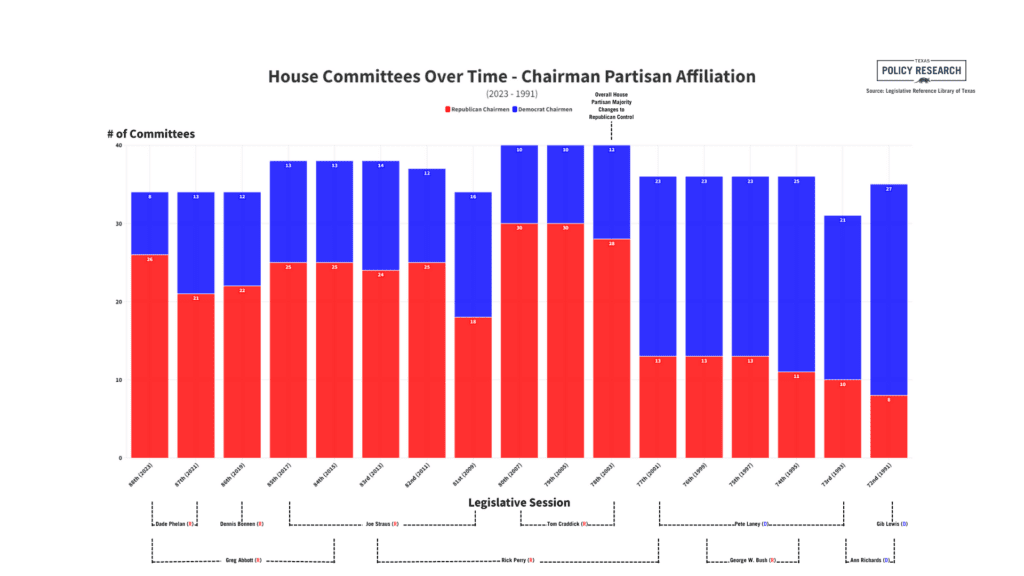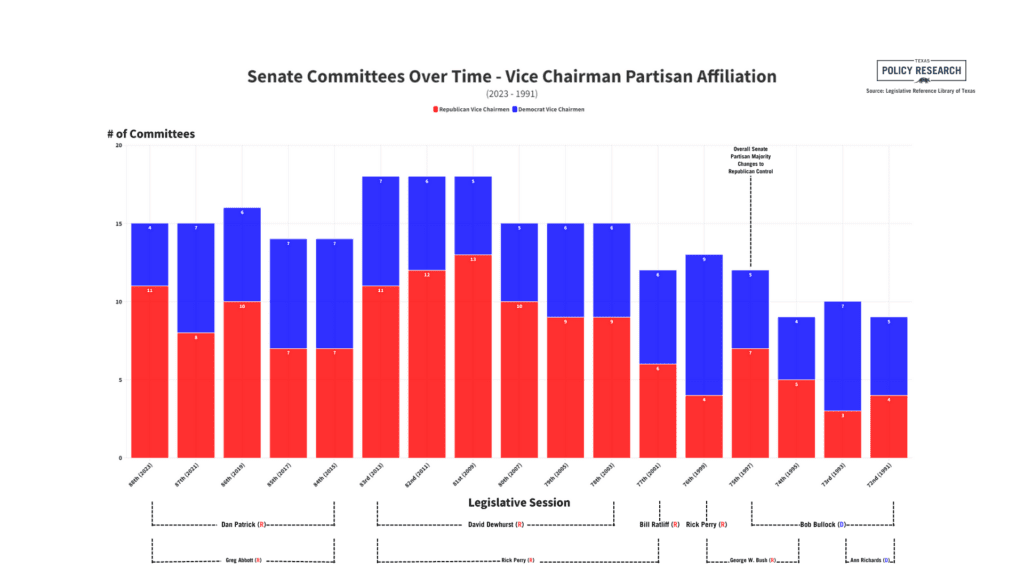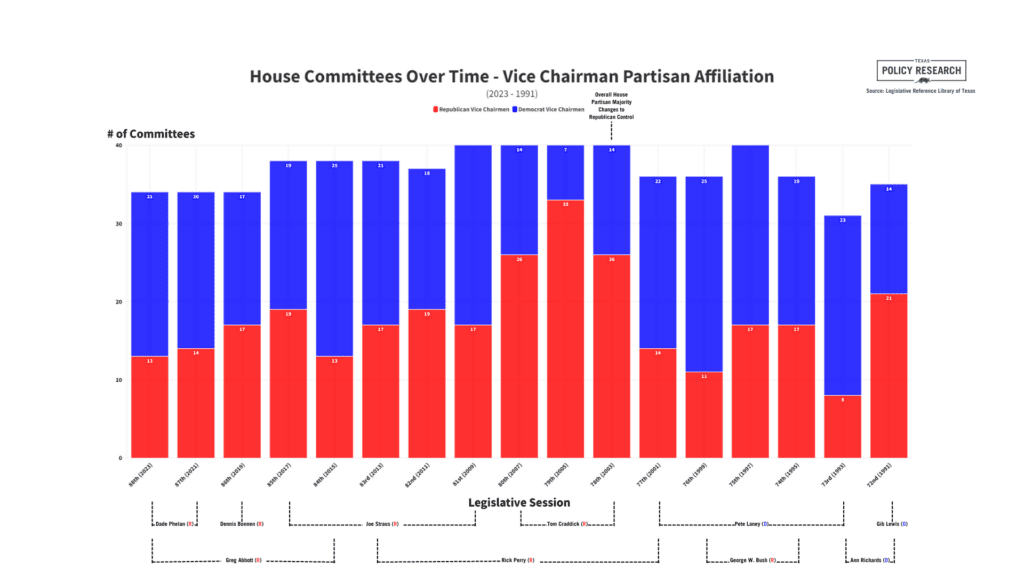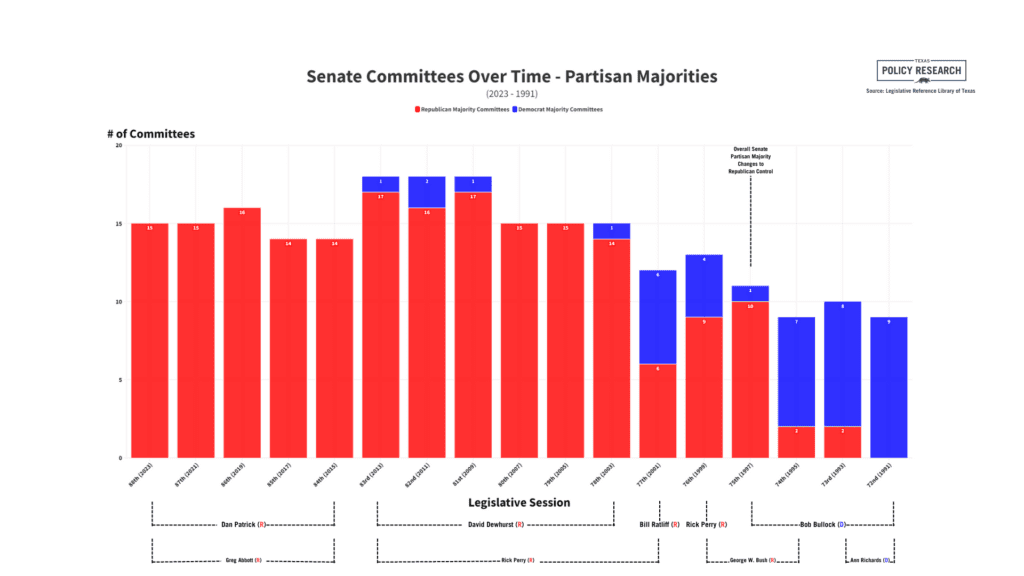Estimated Time to Read: 5 minutes
In recent years, a contentious issue has stirred within Texas politics: the allocation of committee chairmanships in the Texas Legislature. Republican-oriented activists and political observers have dubbed this debate “No Democrat Chairs,” a movement that calls for restricting committee leadership positions exclusively to the majority party, which in the case of the Texas Legislature has been the Republican Party for over two decades. This phenomenon has gained momentum, reflecting broader national trends of partisan polarization and raising questions about the future of legislative governance in Texas.
Historical Context
Traditionally, the Texas Legislature has taken a bipartisan approach to committee assignments, allowing members of both parties to hold chairmanships. Proponents argue that this practice fosters collaboration, ensures varying perspectives in policymaking, and upholds the democratic principles of representation. However, critics contend that it undermines the majority’s mandate, dilutes policy agendas, and hinders the efficiency of the legislative process.
For much of the last century, the Texas Legislature was controlled by the Democratic Party. The Texas House of Representatives switched to Republican control in 2003 (78th Legislature), and the Texas Senate in 1997 (75th Legislature). The Republican majority, specifically in the Texas House, has often been unstable, except for a supermajority in the 82nd Legislature (2011) with 101 Republicans to 49 Democrats, which was lost in the following session. You can see these trends shift here.
The Rise of “No Democrat Chairs”
The “No Democrat Chairs” movement has emerged as a response to these criticisms, advocating for the consolidation of power within the majority party—currently, the Republicans. Activists argue that by allowing Democrats to chair committees, Republicans are ceding control over critical legislative priorities, leading to diluted conservative policies and compromised legislative agendas. This sentiment has been echoed by various grassroots organizations, political commentators, and conservative lawmakers.
The 2022 Republican Primary ballot included a proposition asking voters their position on:
Proposition 6: The Republican-controlled Texas Legislature should end the practice of awarding committee chairmanships to Democrats.
2022 Republican Primary Election Ballot, Proposition 6
That proposition passed overwhelmingly with 1,502,866 (81.24%) voting in favor and only 347,154 (18.76%) voting in opposition.
The official 2024 and 2022 legislative priorities of the Republican Party of Texas include a priority dedicated to this issue:
No Democrat Chairs: The Republican-controlled Texas Legislature shall end the practice of awarding committee chairmanships to Democrats and require all committees to be majority Republican.
2024 Legislative Priorities, Republican Party of Texas
At the start of the 88th Legislative Session (2023), several amendments were proposed to address the issue of committee chairmanships during the deliberation of the Texas House Rules of Procedure. Then-State Rep. Bryan Slaton (R-Royse City) offered an amendment to ensure all committee chairmen were from the majority party, which failed due to a Point of Order. Slaton’s second amendment, requiring specific committees to have majority party chairmen, also failed for the same reason. Consequently, the practice continued: Speaker Dade Phelan (R) appointed 26 Republican (76.47%) and 8 Democrat (23.53%) chairmen for the 34 standing committees in the Texas House. The other legislative chamber also continued the practice. In the Texas Senate, Lieutenant Governor Dan Patrick (R) appointed 14 Republican (93.33%) and 1 Democrat (6.67%) chairmen for the 15 standing committees.
Data Insights: Comprehensive Data Project
To shed light on this ongoing discussion, Texas Policy Research has launched a comprehensive data project analyzing standing committee chairmanships from 1991 to 2023, or between the 72nd and 88th Legislatures. This project provides a detailed breakdown of chairmanships by party, vice-chairmanships by party, and partisan majorities of the committees as a whole, highlighting trends and shifts over the past three decades. Key findings include:
- Shifts in Chairmanship Distribution: The data reveals significant fluctuations in the allocation of chairmanships between parties, reflecting changes in political control and strategic decisions by legislative leaders.
- Impact of Political Dynamics: Major electoral shifts, such as the Republican takeover of the Texas House in 2003, have had profound impacts on committee leadership, often prompting reassessments of bipartisan chairmanship practices.

Senate Committees Over Time – Chairman Partisan Affiliation

House Committees Over Time – Chairman Partisan Affiliation
Additionally, the project includes detailed analyses of committee vice-chairmanships and partisan majorities within committees, which provide a more comprehensive view of legislative leadership dynamics.
- Committee Vice-Chairmanships: Analysis reveals patterns similar to those found in chairmanships, with significant shifts correlating with changes in majority control. The role of vice-chairmen is crucial as they often act as the second in command and can influence committee agendas and decisions.
- Partisan Majorities: The data on partisan majorities within committees highlights the overall balance of power and its implications for legislative proceedings. This analysis shows how majority-party dominance or minority-party influence can affect legislative outcomes and policy directions.
Conclusion
The “No Democrat Chairs” movement underscores the evolving dynamics of Texas politics and the ongoing debate over the principles of governance. The data provided by Texas Policy Research offers valuable context and a deeper understanding of the implications of these leadership decisions.
For those interested in exploring this issue further, the full dataset and analysis are available here.
Texas Policy Research relies on the support of generous donors across Texas.
If you found this information helpful, please consider supporting our efforts! Thank you!







